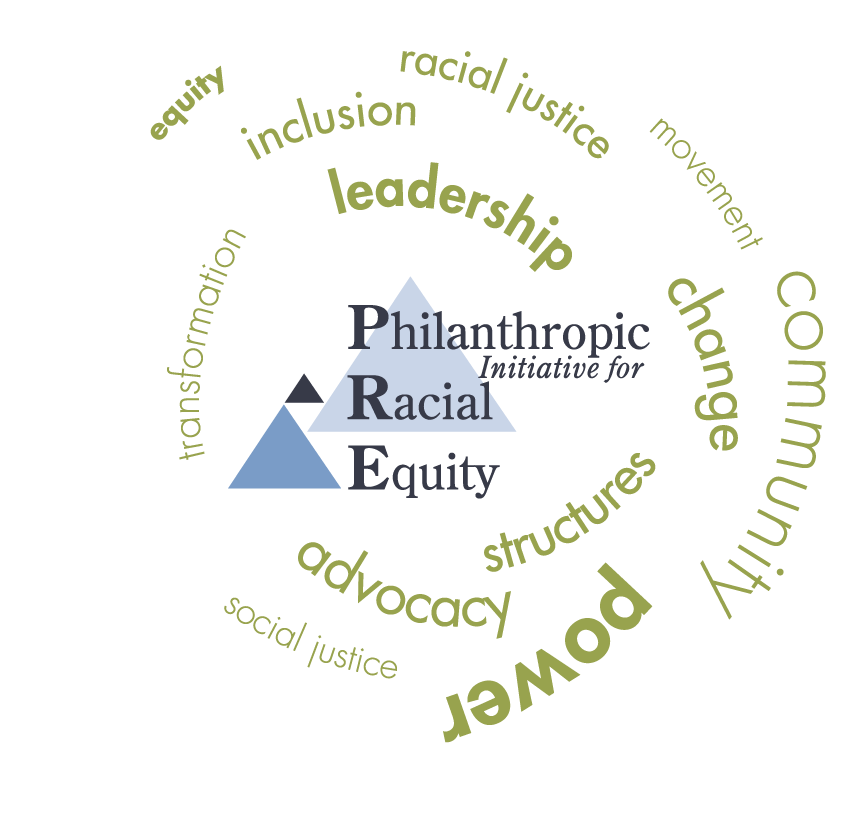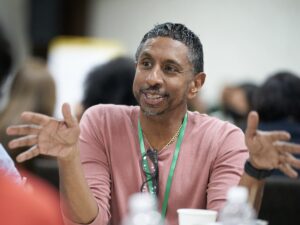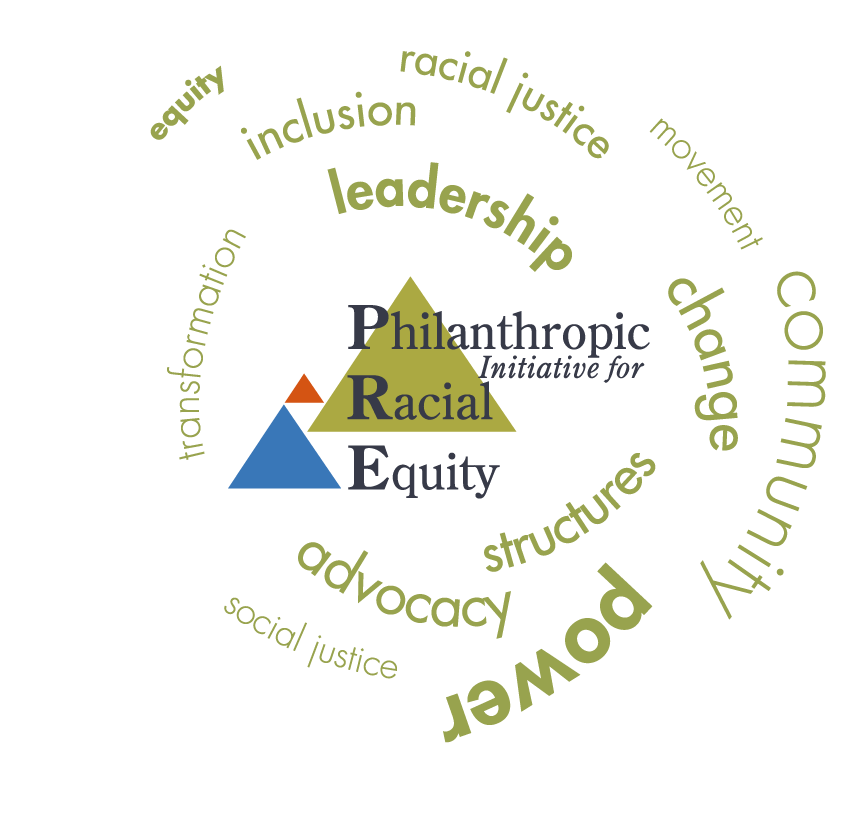PRE Senior Fellows
PRE is proud to announce a new PRE Senior Fellow for 2024–2025, Gihan Perera, joining current PRE Senior Fellow Ben Francisco Maulbeck.
Each of these brilliant, experienced leaders bring decades of wisdom and deep understanding about the intersections of racial and social justice movement work, along with a perspective of philanthropy informed by their respective positions — as movement leaders, as fundraising executive directors, as re-grantors, as advisors to foundations, and, utilizing many of those hats, as organizers of money and other resources. They are each phenomenal communicators who will share knowledge and insights through projects to expand the collective voice of PRE’s constituency.
We appreciate the fellowship as a way to expand the collective voice of PRE’s constituency, and as an opportunity to glean some of the powerful insights of these former executive directors when they have a bit more space for this reflection while in transition.
Gihan Perera was one of PRE’s founding board members from 2003-2017. He actually helped conceive of the Senior Fellowship while running Florida New Majority, recognizing how much effective executive directors of movement organizations were increasingly being called on to share their knowledge with other organization and with funders, but how difficult it was to carve out that time while doing the intensely demanding work of running their organizations, collaborating with partners, fundraising and more. Nearly 10 years after the initial board discussion on the fellowship concept, the timing has been ideal for the opportunity to tap into his wisdom & experience in a moment when philanthropy and movement are grappling with important questions of what it takes to build power effectively and how to resource it sustainably. 

 Gihan is a ‘liminalist.’
Gihan is a ‘liminalist.’  Ben Francisco Maulbeck is a consultant, writer, and leader for social change. Previously, Ben served as executive director of Funders for LGBTQ Issues, where they facilitated the launch of initiatives to increase resources for LGBTQ communities in the American South and for transgender communities across the country; helped found the Contigo Fund in response to the tragic Pulse shooting; and spearheaded a successful strategic plan to expand foundation funding for LGBTQ issues to $200 million.
Ben’s other previous work includes service at Hispanics in Philanthropy, the Philadelphia Foundation, and the William Way Community Center. For more than a decade, they were an active leader in CHANGE Philanthropy, helping guide its transition from the Joint Affinity Groups into an expanded coalition for the advancement of racial and social justice in the philanthropic sector.
Under the pen name Ben Francisco, their science fiction, fantasy, and magic realism stories have been published in Best Gay Stories, Fireside Magazine, Realms of Fantasy, and From Macho to Mariposa: New Gay Latino Fiction.
Ben had been a longtime partner through his role as executive director of Funders or LGBTQ Issues and as a collaborator in our joint Intersectional Racial Justice Funders Lab in 2019. As a Senior Fellow, Ben is one of the researchers and authors of
Ben Francisco Maulbeck is a consultant, writer, and leader for social change. Previously, Ben served as executive director of Funders for LGBTQ Issues, where they facilitated the launch of initiatives to increase resources for LGBTQ communities in the American South and for transgender communities across the country; helped found the Contigo Fund in response to the tragic Pulse shooting; and spearheaded a successful strategic plan to expand foundation funding for LGBTQ issues to $200 million.
Ben’s other previous work includes service at Hispanics in Philanthropy, the Philadelphia Foundation, and the William Way Community Center. For more than a decade, they were an active leader in CHANGE Philanthropy, helping guide its transition from the Joint Affinity Groups into an expanded coalition for the advancement of racial and social justice in the philanthropic sector.
Under the pen name Ben Francisco, their science fiction, fantasy, and magic realism stories have been published in Best Gay Stories, Fireside Magazine, Realms of Fantasy, and From Macho to Mariposa: New Gay Latino Fiction.
Ben had been a longtime partner through his role as executive director of Funders or LGBTQ Issues and as a collaborator in our joint Intersectional Racial Justice Funders Lab in 2019. As a Senior Fellow, Ben is one of the researchers and authors of  Makani Themba is chief strategist at Higher Ground Change Strategies, and as a social justice innovator and pioneer in the field of change communications and narrative strategy has spent more than 30 years supporting organizations, coalitions, and philanthropic institutions in developing high-impact change initiatives.
Makani is the founder and served as executive director of The Praxis Project, a nonprofit helping communities use media and policy advocacy to advance health justice. Under her leadership, it raised tens of millions of dollars for organizations working in communities of color and provided training and technical assistance to hundreds of organizations and public agencies nationwide. She is also co-author of Fair Game: A Strategy Guide for Racial Justice Communications in the Obama Era, published by Praxis Media Productions.
Makani has published and contributed to numerous articles, case studies, and books on structural racism, class, media, policy advocacy, and philanthropy. She is author of Making Policy, Making Change: How Communities Are Taking Law into Their Own Hands, and co-author of Media Advocacy and Public Health: Power for Prevention and Talking the Walk: Communications Guide for Racial Justice.
One of the longest-serving founding members of PRE’s board, Makani has worked on multiple projects and as senior editor and a contributor to PRE’s Critical Issues Forum. As a Senior Fellow, Makani will explore the development of “organic” intermediary institutions and their role in movement ecosystems, as well as philanthropic practice in relationship to Black power building infrastructure.
Makani Themba is chief strategist at Higher Ground Change Strategies, and as a social justice innovator and pioneer in the field of change communications and narrative strategy has spent more than 30 years supporting organizations, coalitions, and philanthropic institutions in developing high-impact change initiatives.
Makani is the founder and served as executive director of The Praxis Project, a nonprofit helping communities use media and policy advocacy to advance health justice. Under her leadership, it raised tens of millions of dollars for organizations working in communities of color and provided training and technical assistance to hundreds of organizations and public agencies nationwide. She is also co-author of Fair Game: A Strategy Guide for Racial Justice Communications in the Obama Era, published by Praxis Media Productions.
Makani has published and contributed to numerous articles, case studies, and books on structural racism, class, media, policy advocacy, and philanthropy. She is author of Making Policy, Making Change: How Communities Are Taking Law into Their Own Hands, and co-author of Media Advocacy and Public Health: Power for Prevention and Talking the Walk: Communications Guide for Racial Justice.
One of the longest-serving founding members of PRE’s board, Makani has worked on multiple projects and as senior editor and a contributor to PRE’s Critical Issues Forum. As a Senior Fellow, Makani will explore the development of “organic” intermediary institutions and their role in movement ecosystems, as well as philanthropic practice in relationship to Black power building infrastructure.  Malkia Devich Cyril is a writer, poet, public speaker, and award-winning activist on issues of digital rights, narrative power, Black liberation, and collective grief.
A leader and widely published advocate on media justice issues for more than 20 years, Malkia spearheaded the national grassroots campaign for net neutrality as an issue central to the struggle for racial justice. Founder and former executive director of
Malkia Devich Cyril is a writer, poet, public speaker, and award-winning activist on issues of digital rights, narrative power, Black liberation, and collective grief.
A leader and widely published advocate on media justice issues for more than 20 years, Malkia spearheaded the national grassroots campaign for net neutrality as an issue central to the struggle for racial justice. Founder and former executive director of 
